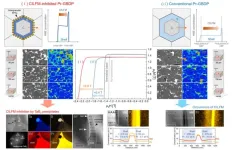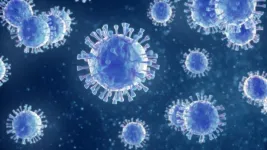(Press-News.org) People with favourable socioeconomic conditions, such as high incomes or education levels, face a reduced risk of age-related diseases and show fewer signs of biological ageing than peers of the same age, finds a new study led by University College London (UCL) researchers.
Social inequalities appear to have a direct impact on the biological ageing process, according to the authors of the Nature Medicine paper.
The scientists found that people with more social advantages had fewer proteins in their blood that are linked to the ageing process, including those connected to inflammation and the immune system.
Lead author Professor Mika Kivimaki (UCL Faculty of Brain Sciences) said: “This study provides strong biological evidence that social conditions influence the pace of ageing. For decades, we’ve known that social advantage is linked to better health, but our findings suggest it may also slow down the ageing process itself.
“Our study highlights that healthy ageing is an achievable goal for society as a whole, as it is already a reality for people with favourable socioeconomic conditions.”
The study is based on four large longitudinal studies that have been tracking their participants for many years: the Whitehall II study in the UK (which is led by Professor Kivimaki as Director), the UK Biobank, the Finnish Public Sector Study (FPS), and the Atherosclerosis in Communities (ARIC) study in the US.* Together, these studies include over 800,000 participants.
The measures of social advantage included both early-life factors, such as education and father’s socioeconomic position, and adulthood indicators such as neighbourhood deprivation, occupational status, or household income.
The markers of ageing were measured by diagnoses for diseases known to be linked to ageing, and by blood tests measuring proteins circulating in the blood’s plasma, in a measurement called advanced plasma proteomics. Many proteins are known to impact the ageing process, while ageing also impacts the mix of proteins in the blood, so protein counts can reflect multiple age-related processes that may be occurring before the onset of any diseases.
Disease outcomes were determined over 10 years after the measures of social advantage for two of the cohorts, and over 20 years later for the Whitehall II and ARIC cohorts, to discover if early or mid-life social factors contributed to ageing many years later.
The researchers found that the risk of 66 age-related diseases was affected by social advantage. Averaged across the list of diseases, there was a 20% higher risk of disease for people with low socioeconomic status relative to high socioeconomic status, while after 15 years, those with low socioeconomic status had a similar number of age-related disease diagnoses as those in the high socioeconomic status group did after 20 years.
For some diseases, including type 2 diabetes, liver disease, heart disease, lung cancer and stroke, the risk was more than twice as high in the most disadvantaged group relative to the most advantaged.
The scientists found that levels of 14 plasma proteins were affected by socioeconomic advantage, including proteins known to regulate inflammatory and cellular stress responses. The researchers estimated that up to 39% of the reduced disease risk in socioeconomically advantaged people may be influenced by these proteins.
Co-author Professor Tony Wyss-Coray (Stanford University) explained: “Ageing is reflected in the makeup of proteins in our blood, which includes thousands of circulating proteins linked to biological ageing processes across multiple organ systems. These biomarkers are indicators of health that enable us to assess how social differences can dictate the pace of ageing.”
The researchers found evidence that changes to social standing can have a measurable impact on biological ageing, as people who progressed from low levels of education early in life to middling or high social advantage later in life had more favourable protein concentrations relative to those whose circumstances had not improved.
The researchers say that more research is needed to elucidate how exactly social factors can impact biological ageing.
Co-author Professor Dame Linda Partridge (UCL Institute of Healthy Ageing) explained: “While our study does not tell us why social advantage can slow the ageing process, other studies have suggested that it may be related to factors such as life stress, mental health, exposure to pollution or toxins, and behaviours such as smoking, drug and alcohol use, diet and exercise, as well as access to medical screenings, check-ups, vaccinations and medications.”
Another recent study led by the same researchers, published last month**, found that a blood test determining how much our organs have aged could predict the risk of age-related diseases decades in advance, which could help with preventative medicine for people showing signs of accelerated ageing.
Professor Kivimaki added: “Blood tests are able to pick up on signs of accelerated ageing, which could help us to determine who would likely benefit from targeted interventions to improve their health as they age.”
This study was supported by Wellcome, the Medical Research Council, the US National Institutes of Health, and the Research Council of Finland.
* Further detail on which measures came from which cohort study:
Whitehall II: Early life social indicators: father’s occupation, education levels. Adulthood social indicators: neighbourhood deprivation, occupation. Outcomes: age-related proteins, age-related diseases, mortality.
UK Biobank: Early life social indicator: education levels. Adulthood social indicator: neighbourhood deprivation. Outcomes: age-related diseases.
Finnish Public Sector study: Early life social indicator: education levels. Adulthood social indicators: neighbourhood deprivation, occupation. Outcomes: age-related diseases.
Atherosclerosis in Communities study: Early life social indicator: education levels. Adulthood social indicators: neighbourhood deprivation, income. Outcomes: age-related proteins, mortality.
** Related study from February 2025: Biological organ ages predict disease risk decades in advance
www.ucl.ac.uk
UCL News
Whitehall II study
Professor Mika Kivimaki’s academic profile
UCL Faculty of Brain Sciences
UCL Institute of Healthy Ageing, UCL Division of Biosciences END
Social disadvantage can accelerate ageing and increase disease risk
2025-03-14
ELSE PRESS RELEASES FROM THIS DATE:
Breaking free from dependence on rare resources! A domestic high-performance permanent magnet emerges!
2025-03-14
The Nano Materials Research Division at the Korea Institute of Materials Science (KIMS), led by Dr. Tae-Hoon Kim and Dr. Jung-Goo Lee, has successfully developed a groundbreaking grain boundary diffusion process that enables the fabrication of high-performance permanent magnets without the use of expensive heavy rare earth elements. This pioneering technology, marks the world’s first achievement in this field.
Permanent magnets are key components in various high-value-added products, including electric vehicle (EV) motors and robots. However, conventional permanent magnet manufacturing processes have been heavily dependent on ...
Symptoms of long-COVID can last up to two years after infection with COVID-19
2025-03-14
23% of people infected with SARS-CoV-2 between 2021 and 2023 developed long-COVID, and in more than half of them the symptoms persisted for two years. These are the main conclusions of a study conducted by ISGlobal, a centre supported by the ”la Caixa” Foundation, and in collaboration with the Germans Trias i Pujol Research Institute (IGTP), as part of the European END-VOC project. The risk of developing long-COVID depends on several factors, according to the results published in BMC Medicine.
After overcoming an initial ...
Violence is forcing women in Northern Ireland into homelessness, finds new report
2025-03-14
Violence is trapping women across Northern Ireland in cycles of trauma and homelessness, with some facing further abuse in temporary accommodation, despite moving there to find a place of safety.
The research from Heriot-Watt University and University of Edinburgh was commissioned by the Community Foundation for Northern Ireland and funded by the Oak Foundation. It is based on in-depth interviews with women with lived experience of violence over five areas of Northern Ireland.
The areas include Belfast and Derry, one smaller urban area in County Down, and two more rural areas of County Antrim and County Fermanagh. The report also covers findings from focus groups with frontline workers ...
Latin American intensivists denounce economic and cultural inequities in the global scientific publishing system
2025-03-13
Researchers from Brazilian, Argentine, and Uruguayan institutions analyze the barriers that low- and middle-income countries face in disseminating research on intensive care medicine, particularly in the treatment of critically ill patients. Published this month in The Lancet, the study highlights how historical and economic biases perpetuate inequalities and suggests changes to make the scientific publishing system more inclusive and representative of the global community.
Low- and middle-income countries are home to 85% of the world's population and bear a disproportionate burden of critical illnesses. ...
Older adults might be more resistant to bird flu infections than children, Penn research finds
2025-03-13
PHILADELPHIA— Prior exposures to specific types of seasonal influenza viruses promote cross-reactive immunity against the H5N1 avian influenza virus, according to new research from the Perelman School of Medicine at the University of Pennsylvania. Older adults who were exposed to seasonal flu viruses that circulated prior to 1968 were found to be more likely to have antibodies that bind to the H5N1 avian flu virus. The findings, published today in Nature Medicine¸ suggest that younger adults and children would benefit more from H5N1 vaccines, even those not tailored specifically to the current strain circulating in birds and ...
Dramatic increase in research funding needed to counter productivity slowdown in farming
2025-03-13
ITHACA, N.Y. – Climate change and flagging investment in research and development has U.S. agriculture facing its first productivity slowdown in decades. A new study estimates the public sector investment needed to reverse course.
In the paper, published in the Proceedings of the National Academy of Sciences, researchers model both the dampening effects of climate change on U.S. agriculture and the accelerating effects of publicly funded research and development (R&D) – and use the estimates to quantify the investment in research required to maintain agricultural productivity through 2050.
They find that a 5% to 8% per year growth in research investment ...
How chemistry and force etch mysterious spiral patterns on solid surfaces
2025-03-13
Key takeaways
Curiosity about a mistake that left tiny dots on a germanium wafer with evaporated metal films led to the discovery of beautiful spiral patterns etched on the surface of the semiconductor by a chemical reaction.
Further experiments showed that the patterns arise from chemical reactions that are coupled to mechanical forces through the deformation of a catalyzing agent.
The new system is the first major advance in experimental methods to study chemical pattern formation since the 1950s. Studying these complex systems will help scientists understand other natural processes, from crack formation in materials to how stress ...
Unraveling the mysteries of polycystic kidney disease
2025-03-13
OKLAHOMA CITY – Polycystic kidney disease (PKD), a family of genetic disorders that causes clusters of cysts to form on the kidney, is among the most common genetic disorders, affecting some 500,000 people in the United States. Roughly one in every 1,000 people will develop some form of cystic kidney disease during their lifetime, and nearly 40,000 Oklahomans have a chronic kidney disease, according to the Oklahoma Health Care Authority.
For many patients, dialysis – a time-consuming and costly procedure – is one of few treatment options. A 2021 study ...
Mother’s high-fat diet can cause liver stress in fetus, study shows
2025-03-13
OKLAHOMA CITY – When mothers eat a diet high in fat and sugars, their unborn babies can develop liver stress that continues into early life. A new study published in the journal Liver International sheds light on changes to the fetus’s bile acid, which affects how liver disease develops and progresses.
Bile acids typically help with digestion and absorb dietary fats in the small intestine, but when they reach excessive levels, they become toxic and can damage the liver. While the mother can detoxify the acids, the fetus lacks that ability. Bile acids may re-circulate to the mother for detoxification, but if they don’t, they build ...
Weighing in on a Mars water debate
2025-03-13
More than 3 billion years ago, Mars intermittently had liquid water on its surface. After the planet lost much of its atmosphere, however, surface water could no longer persist. The fate of Mars’ water—whether it was buried as ice, confined in deep aquifers, incorporated into minerals or dissipated into space—remains an area of ongoing research, one of particular interest to LASP Senior Research Scientist Bruce Jakosky, former principal investigator of the Mars Atmosphere and Volatile EvolutioN (MAVEN) mission.
Last week, in a letter to the editor ...





